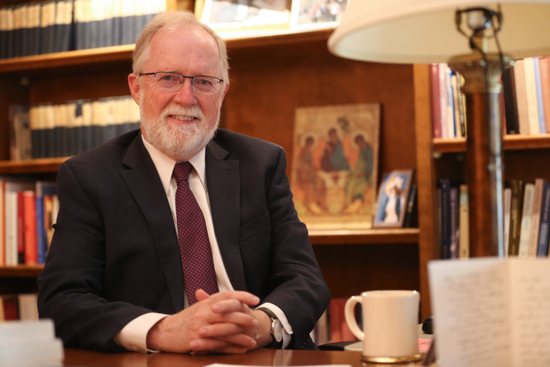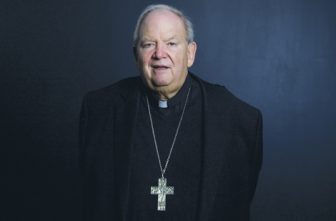
A guidebook for business leaders that was developed largely by local Catholics and released as an official Vatican document in 2012 made a big splash around the world, but it remains largely unknown in the Archdiocese of St. Paul and Minneapolis.
Seven years later, its proponents say it is more relevant than ever, and one is preparing to take it to the masses, beginning with a class this fall at his Chanhassen parish.
A small team at the University of St. Thomas’ Center for Catholic Studies in St. Paul took the lead in developing the groundbreaking 30-page reflection titled “Vocation of the Business Leader,” with Director Michael Naughton at the helm. The document marked the first time that the Catholic Church affirmed business as a vocation. Its indispensable role in providing for the common good and promoting human dignity was highlighted – — a stark contrast to the mercenary nature of business often implied by theologians.
The document is broken into 87 short sections — many a single paragraph — and concludes with reflection questions. The introduction lays out a central premise: “Obstacles to serving the common good come in many forms — corruption, absence of rule of law, tendencies towards greed, poor stewardship of resources — but the most significant for a business leader on a personal level is leading a divided life. This split between faith and daily business practice can lead to imbalances and misplaced devotion to worldly success. The alternative path of faith-based ‘servant leadership’ provides business leaders with a larger perspective and helps them to balance the demands of the business world with those of ethical social principles, illuminated for Christians by the Gospel.”
The document was born of a 2011 seminar held at the Pontifical Council for Justice and Peace in Rome in collaboration with UST’s Center for Catholic Studies. There, business leaders and professors from a range of disciplines — from philosophy to management — attempted to interpret Pope Benedict’s 2009 encyclical “Caritas in Veritate” (“Charity in Truth”) for the marketplace.
“There was some puzzlement about: What does that mean for business?” Naughton said.
The seminar was so fruitful that he proposed to Cardinal Peter Turkson, president of the council, that they create a follow-up “handbook” for faith-based business leaders, whom they defined as executives and business owners along with influential lower-level employees.
An intense year
The cardinal’s green light began an intensive year of cross-country collaboration and conference calls filtered through Naughton’s keyboard. The father of five rose early, pouring over extensive notes, conflicting opinions and copious coffee to develop the document in the office of his St. Paul home, sharing early drafts with his wife and students.
“I certainly think the Holy Spirit was there,” said Naughton, a member of Holy Spirit in St. Paul and a 2018 Leading with Faith Award winner.
His education — a doctorate in theology and an MBA — equipped him well to steer the drafting committee. As challenging input streamed in and new drafts emerged, Naughton’s collaborators said they came to appreciate his critical thinking and diplomatic touch.
“Mike did a remarkable job of shepherding this whole thing through,” said Robert Kennedy, a Catholic Studies professor who contributed to the document and belongs to Nativity of Our Lord in St. Paul. “He can move something forward without alienating people.”
One contributor who helped keep the document practical for busy executives was Pierre Lecocq, a Catholic father in Paris who had served as CEO of a large European printing service supplier.
Power can corrupt, Lecocq said. “It’s a drug — running fast, making decisions every day. You have to step back and say: ‘Hey, wait a minute. Am doing this because I really have to, or because I love doing it?’”
Being a Catholic business leader does not mean you will never fire employees, Lecocq said. Rather, it means you approach it with as much sensitivity as possible, being transparent about workplace changes so a lay-off does not come as a complete surprise and then helping that person find new work.
Naughton synthesized all these thoughts, and the result was a reflection that is both deep and palatable. It challenges business leaders to create goods that are good and services that truly serve. It also calls for subsidiarity to enable employees to exercise their gifts and feel empowered as “co-entrepreneurs.”
Global reach
“Vocation of the Business Leader” delighted its commissioner, Cardinal Turkson, the jovial church leader from Ghana, who promoted it widely. Unlike similar Vatican documents that have seemed to die on the branch shortly after being issued, this one grew legs. It was translated into 15 languages and embraced throughout parts of Asia, Africa, Europe and South America.
Also rare: It generated four new editions updating the initial one, further proof it had become a living, breathing document.
The latest edition, spearheaded by Naughton and released in March, incorporates insights from Pope Francis on sustainability and the technocratic paradigm, the modern inclination to dominate the natural world through technology. All told, the revisions have spanned nearly eight years. Naughton said he expects a pause for now but he could envision another edition inspired by a new pontiff or some other notable influence.
The document has had a profound impact. Pope Francis has referred to it on multiple occasions. The International Christian Union of Business Executives took it on as part of its cause, disseminating it through its far-flung chapters. And it inspired local Catholics at the Catholic Rural Life office in St. Paul to write “Vocation of the Agricultural Leader,” a reflection published in 2016 by the International Catholic Rural Association in Rome.
And yet, for its remarkable reach, “Vocation of the Business Leader” remains relatively unknown in the archdiocese where it was born.
“Oddly enough, this document hasn’t had the impact in the United States that it’s had in other parts of the world,” Kennedy said. “I’ve been really surprised that it’s had almost no attention in this archdiocese. That’s partly our fault. We’ve been busy and haven’t had the chance to work hard to encourage parishes to do programs or encourage other events in the archdiocese.”
Naughton agrees with his colleague. He said he is aware of a few business courses at St. Thomas that use the document. Since its 2012 release, Naughton has given “several” talks on it, he said, including one to a local gathering of Legatus, an organization of Catholic business leaders. However, it has never been the subject of the quarterly talks held at St. John Vianney College Seminary through the Virtuous Business Leaders group, when local Catholic business people join the seminarians for Mass, supper and reflection.
“I would guess of those 60 men that show up, there’s a chance none of them have seen this,” said Rich Chapman, a member of Our Lady of Grace in Edina. Chapman works as managing director at Chartwell Financial Advisory in Minneapolis and learned about “Vocation of the Business Leader” when Naughton showed him a draft.
“I think this document has been under-utilized,” Chapman said. “Why don’t we have it in the hands of every Catholic business leader and create a venue to discuss and grow? The document is a hidden gem.”
For Chapman, “Vocation of the Business Leader” reminds him to re-examine secular standards of success. “Speed is almost worshipped in business — how quickly can you complete a project or penetrate a market,” he said, noting that Chartwell is a fast-growing business. “My prayer life would be: God, help me discern when speed is compromising something.”
A higher call
When business leaders see their work as a vocation, they are inspired to provide servant leadership and, ultimately, evangelize the workplace, Chapman said. “The business leader has to be attuned to the opportunity to help form people in virtue. And virtue in the workplace is a gateway to the Gospel. That’s how I’ve always viewed my work: This is a calling for me, it’s an opportunity to do God’s work.”
Bill Bojan, a member of St. Hubert in Chanhassen, shares that view. A director in business risk services at the Minneapolis accounting firm CliftonLarsonAllen, Bojan has worked at other firms that spiraled into crisis. The trouble, he said, comes from focusing on management — how a ship is run — versus governance, where it’s being steered.
Bojan said he has developed a practical application for “Vocation of the Business Leader” based on biblical governance. “I’ve been on a 10-year mission to take all my experiences and expertise and create the ‘how’ to this beautiful ‘what,’” he said.
Bojan built a website (solomon365.com), recorded podcasts and is starting a class this fall through St. Hubert’s men’s ministry team to study and embrace the vocation of the business leader. He’s eager to take his pilot program to other parishes and begin a speaking circuit.
The authors of “Vocation of the Business Leader” consider their document more needed than ever, given the pace and pressures of today’s workplace and growing economic inequalities.
“Businesspeople have a crucial vocation in society and the Church if we are to reinforce what is good and overcome what is bad, to create a truly human and sustainable economy,” said Sister Helen Alford, a Dominican who worked with Naughton to coordinate the document’s creation and serves as dean of the Faculty of Social Sciences at the Pontifical University of St. Thomas Aquinas in Rome.
Indeed, Naughton said, the stakes are high: Business leaders with a sense of vocation meet the needs of the world, compelled by a keen sense of purpose.
“The document reminds us that we have been called and there’s a dignity to that call, and the call is getting to the deepest purpose of who we are,” Naughton said. “Our achievements and our money and our rewards are all going to betray us. They’re nice to have, but they’re not the place we want to locate our meaning.”



